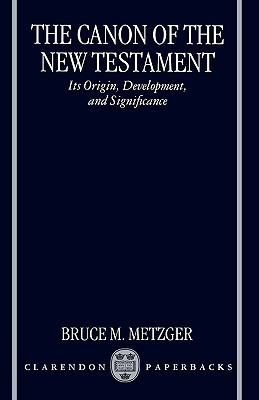Whether you like it or not, our lexicons, translations, and canons are just as valid as yours ( probably more so )
"probably more so" ??? As if that's not the very same type of acerbic comment that you
just scolded me for. (What a hoot.)
You should be reviewing your own comments made over the last week or so before scolding me.
And yet... WHAT LEXICON?
What lexicon have you ever quoted from? Strong's? NOT a lexicon my brother. And the majority of a Strong's entry comes AFTER the dash, which is just a list of words that were selected for use in the King James. Thayer's? Obsolete before even being published, as he never had access to (or used) the Koine papyri coming out of Egypt. All Thayer did was revise and translate the edition of
C.G. Wilke's
Clavis Novi Testamenti - first published in 1841 (
LINK). Koine wasn't discovered until 1898.
I spent the time effort and energy of decades to understand how the actual text reads and what the actual text says.
You can't even admit that you messed up your own attempt to show off that you know Greek. (WE assume too much?) So why should I give any time to someone
that dishonest?
And for this, my brutal honesty and integrity to NOT change the words, that's what you're crucifying
me for? (
Rhetorical, because that IS what you're kvetching about.) But you're not alone. I was banned from here for an entire year because I had the audacity to reprimand
you for changing the words of the New Testament text.
If you ever deign to learn the language, you would KNOW that your translations are not more valid. But that's a scary abyss to look into isn't it? I'm glad God showed me the edge of that abyss when I was 14 and hadn't wasted 50 years of life in a cult.
And they said unto Moses, Let the Bible translators speak with us, and we will hear: but let not God speak with us, lest we die.
(Exodus 20:19 ~~~)
But we are usually OK with it.
Yes, I'm starting to recognize that you (and even y'all) are okay with being wrong. That you're okay with denying the true Jesus before men. That you're okay with all the errors in whatever crappy Bible you read. That you're okay with all the theological heresies that compose your faith, derived from obviously biased translations. But how would YOU know? You can't even read the Bible, because you don't have the Bible. Just cultic English trash.
When you tell the whole world they are wrong, and you are right, ... that they are uneducated, can't spell, can't type correctly,
... you lose your audience. Without love, you are just noise.
At least I have pushed through and know what Truth is. The teachings of Jesus are Truth, and there's not once where he ever said that his blood would pay for your sins. Christ commanded that we worship in Spirit (of which love is part) AND Truth, a truth that necessitates an accuracy in knowledge of the New Testament texts. An accuracy that I've been presenting, only to be buffeted with anger and vitriol because indeed, men do NOT love the truth.
And with all deceivableness of unrighteousness in them that perish; because they received not the love of the truth, that they might be saved.
(2 Thessalonians 2:10 KJV)
Those who do indeed love truth would eagerly await my posts, given to show insight into both the language and the understanding of the teachings of Jesus.
And you? You want me to sooth and scratch the itching ears to gain an "audience"? One that will stop up their ears when hearing something that they might just not like to hear? (Oh, well we can't offended anybody with any radical teachings, now can we.)
What hypocrisy - telling me to please men, when you yourself adhere to the following as "God's Word":
For do I now persuade men, or God? or do I seek to please men? for if I yet pleased men, I should not be the servant of Christ.
(Galatians 1:10 KJV)
For the time is coming when people will not put up with sound doctrine, but having itching ears, they will accumulate for themselves teachers to suit their own desires,
(2 Timothy 4:3 NRSV)
I'm not here to accumulate an audience of people with itching ears. I truly don't care if anybody likes me or not. And if a man cannot abide by my teachings, then let him crawl back into the bottle of his fictional religion.
Iron sharpens iron, and one person sharpens the wits of another.
(Proverbs 27:17 NRSV)
Obviously, one needs to start with iron to begin with. Triggered people need not apply.
So
@B-A-C ... you ever going to come clean about your abilities in Greek? (And you think to scold me.)
@Christ4Ever has stated on more than one occasion that this type of conversation that you stared should occur in PM. Perhaps you should take his advice.
Rhema
And while I believe that the canon of the Church of the East is correct with regards to their exclusion of Revelation, I no longer adhere to that canon. If you haven' yet read
The Canon of the New Testament by Dr. Bruce Metzger, I'll buy it for you. (
And if you reject the gift, remember that was your choice.)
Completing his New Testament trilogy, eminent theologia…

www.goodreads.com
You seem like a smart guy.
Maybe you should remember that.
